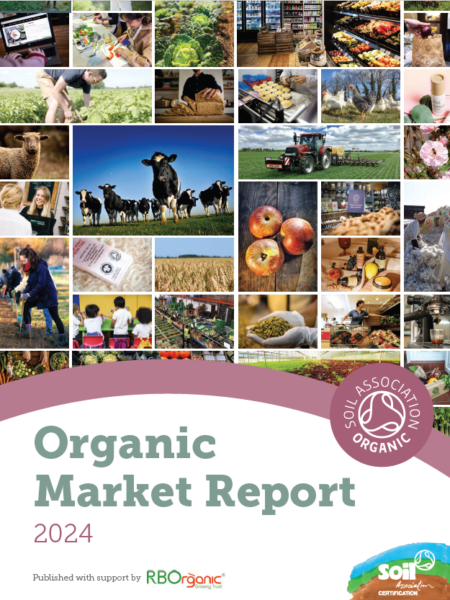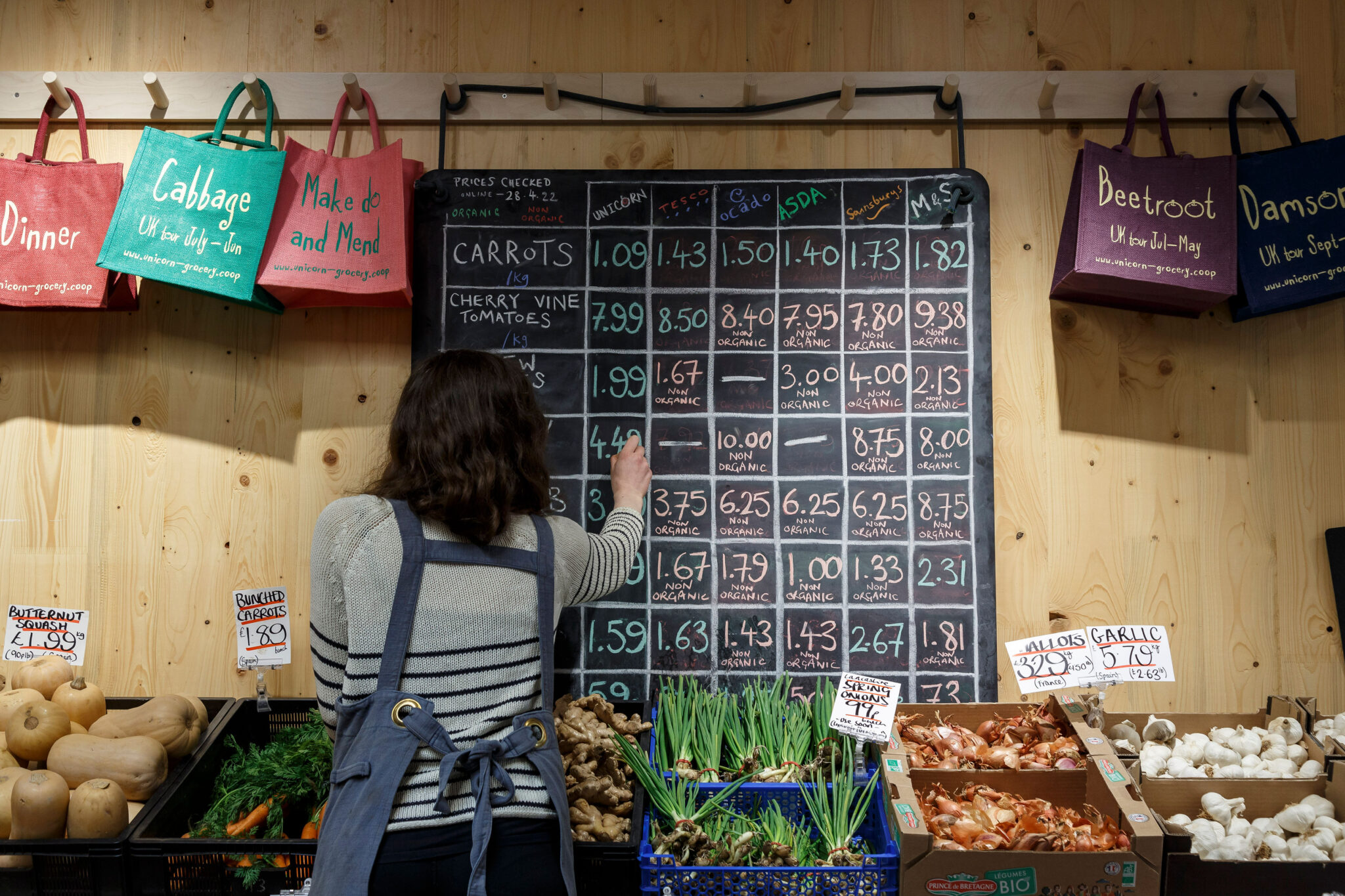The organic food and drink market has delivered its 12th year of positive growth, despite the global political and economic turmoil and a cost-of-living crisis.
This news comes via Soil Association Certification’s 25th edition of its annual Organic Market Report 2024 – sponsored by RBOrganic Ltd – released today, which reveals that the total organic market grew 2% in 2023, ending the year at £3.2 billion – almost double its value in 2011.

However, despite this positive performance, many farmers are currently missing out on the potential benefits organic can bring their business – and in turn, the UK environment is missing out on the benefits that organic can bring for nature – due to the sector’s heavy reliance on imports.
Despite twelve successful years of growth, and a shopper spend on organic being a third higher than five years ago, UK organic farmland has stayed at a static 3%.
Soil Association Certification Commercial Director Alex Cullen said: “Organic has delivered a positive and resilient performance despite challenging financial and political conditions and without the support that organic food and farming receives in Europe and elsewhere in the world.
“The market and macro trends are pointing to an upward trajectory but there are still many challenges and barriers to the level of growth that UK organic should be delivering for farmers – with price the biggest barrier.
“We need a radical rethink if organic is going to reach its full potential and bring organic farming into the mainstream. The entire supply chain must work together to grow the market and unlock demand for homegrown UK organic fresh produce, supported by the government.
“And we can learn valuable lessons from Europe where there is greater support and commitment from governments and retailers for farmers and from some exciting innovations taking place right here across the UK – to make organic more available and affordable.”
Organic Sales
Independent retailers returned to standout growth in 2023, with sales rising 10% to £475 million. We can look positively into the future too, as more than two-thirds of independent retailers say they expect sales to grow in 2024.
After a difficult 2022, organic supermarket sales saw a growth of 2.7% with the top two categories (dairy and produce) contributing to half of organic sales. Inflation is largely behind this uplift, as units are down -6.7% in 2023. Home delivery has faced a tougher year after previous growth during the pandemic, shrinking -6% to £525 million, however online sales are continuing to be strong performers – 22% of all supermarket organic sales are made through online channels. Soil Association certified products on Amazon saw an encouraging boost in sales, with a 10% increase.
Outside of food and drink, in textiles, the numbers remain strong with sales growing by 8% to £100 million, driven by innovation across the sector. Personal care and adult clothing sales rose fastest – up 13% and 9% respectively. The global demand for organic cotton continues to outstrip supply, with the consumer demand for sustainable textiles continuously rising and more brands committing to sourcing organic cotton as part of their sustainability strategies.
Beauty and wellbeing saw an 8% decline as the cost-of-living crisis and rising inflation affected sales. However, Mother and Baby Care grew significantly by 65%, and health & personal care products including oral care, deodorants and supplements grew by 6%, highlighting a wider trend for consumers prioritising their health.
Exaggerated Organic Premium
The report suggests that sales of organic fresh produce in the UK have slipped in supermarkets due to price-matching on conventional lines, making organic produce look more expensive to customers. The high environmental and animal welfare standards required by organic assurance should attract a modest premium, but the report finds that the supermarket prices for organic, when compared to the farmgate premium, are “significantly out of kilter and warrants closer scrutiny”.
The report says that supermarket pricing in other major markets, including many EU countries have reduced the relative premium on organic produce, unlocking growth on these lines. Similar action in the UK would make organic more affordable for shoppers – a real opportunity for UK retailers.
Cullen said: “Food is not a particularly profitable sector, the recent Competition and Markets Authority investigations have been clear. Of course, every player in the supply chain needs to make a profit but when price is the biggest barrier to scaling the most sustainable and trustworthy farming system we have, there need to be more questions about what it would take to achieve economies of scale. We are undertaking thorough research to understand fully what is happening and how this is impacting organic sales.”
The year ahead
Launched to the industry last November, the Soil Association Group’s ‘Organic For All’ is an ambitious plan to address change in the organic sector, acknowledging the complexity of the industry and providing key turning points to support the sector in a coordinated way.
Cullen said: “We have spent the last few months getting our heads together to understand the barriers and what is required to make organic accessible, affordable and available to all. The next stage is to engage with government and supply chains to build a shared plan. We are getting some of the major retailers and organic brands around the table, they are a vital part of the solution.
“We have also explored shining examples of innovation and growth across Europe where retailers and governments are getting behind organic. Countries like Austria and Germany have gone beyond the EU’s own targets for organic farmland to grow to 25%, instead pushing for 30%, and in Italy discounters Eurospin and Lidl have been instrumental in driving 12% growth in organic sales.
“PENNY, a leading German discount supermarket, launched its ‘true cost’ trial to highlight the impact of food products on climate and health. The prices of nine products from their organic and conventional ranges were increased to reflect this additional cost. This doubled the price of lines with a big environmental and health footprint and saw more moderate price increases on organic and other sustainable choices. The retailer also claims in its advertising that it’s cheaper to do an organic shop with them than a branded one.
“These examples, together with a patchwork of innovation at a local level here in the UK, are demonstrating how growth is possible when supported and scaled. Such as Unicorn Grocery in Manchester who are going head-to-head with the supermarkets and beating them on organic produce prices, and Food Sense Wales who are creating local supply chains delivering local grown organic vegetables to schools in Cardiff.
“We are committed to collaborating with the supermarkets to share and develop this kind of innovation as we come out of the cost of living crisis. A rebalancing of the price and availability of organic foods will drive further strong demand and unlock the benefits for people, nature and the planet.”
To download a copy of the report, visit the Soil Association website.





